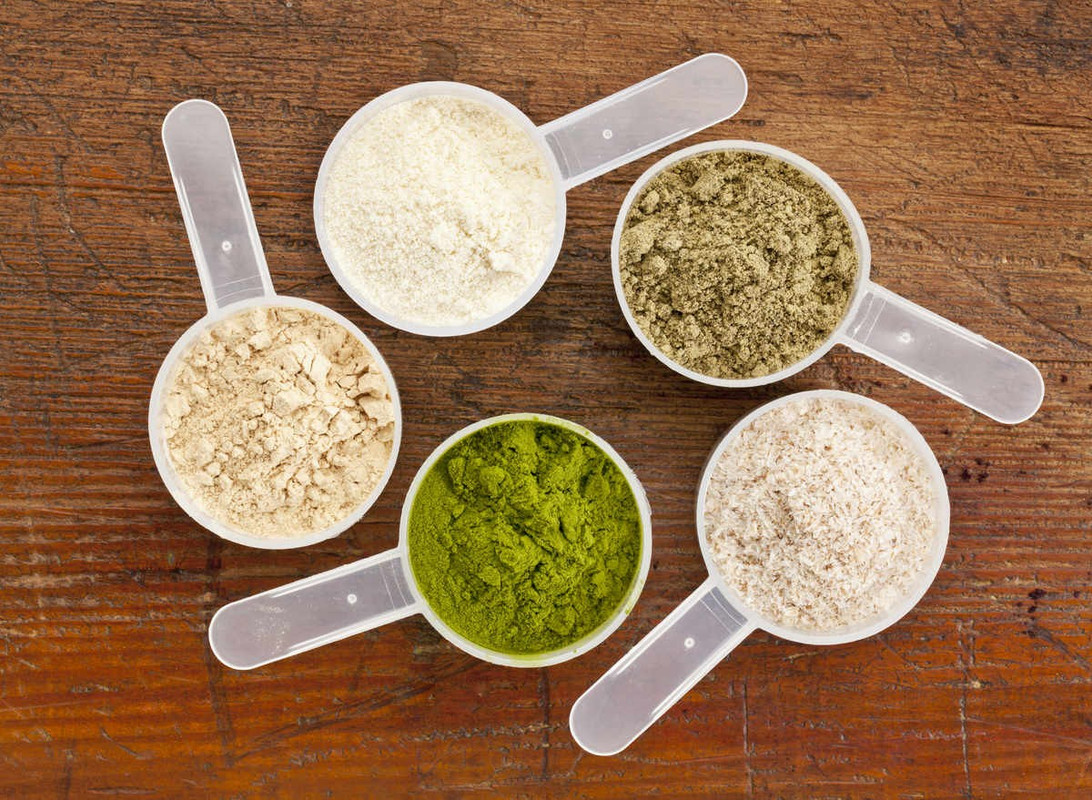Richardbrown
Guest

Supplementing your diet with high-quality protein powder derived from whey or plant sources will help you build muscle, improve post-workout recovery, maintain a healthy metabolism, lose weight, and tone and define your body. But which protein, whey or plant, is the most worthwhile investment? Continue reading to get the inside scoop on the protein powder wars.
WHAT DIFFERENT KINDS OF PLANT PROTEIN ARE THERE?
Plant protein comes in a variety of forms, and some brands blend different proportions of each to create a plant-based powder with a healthy balance of lipids and amino acids. Pea, soy, hemp, and rice are the most frequent plant-based proteins. Here's a rundown of each's nutritional advantages:
PEA PROTEIN
Pea protein is created from yellow split peas (not the delicious green peas you're probably more familiar with) and has a higher protein concentration than other vegan protein powders. Although pea protein is low in the essential amino acid methionine, it is high in three other essential amino acids that are necessary for muscle growth: isoleucine, valine, and leucine.
SOY PROTEIN
Soy protein is a complete protein that contains all nine essential amino acids, unlike most other plant-based proteins. It also has a high protein content and several plant components that may aid in cholesterol reduction.
HEMP PROTEIN
Hemp protein is derived from the cannabis plant, but it does not have the same euphoric effects as marijuana because it contains only tiny quantities of THC. Hemp protein, on the other hand, is high in heart-healthy omega-3 and omega-6 fats, as well as zinc, magnesium, iron, and fiber.
BROWN RICE PROTEIN
Brown rice powder is typically less expensive than other plant protein, with a high protein ratio in its nutritional profile. Rice protein is also often easy to digest. It is not a complete protein even though it includes all of the essential amino acids, since it lacks lysine.
IS PLANT PROTEIN EQUAL TO WHEY PROTEIN IN QUALITY?
Both whey and plant-based proteins can aid in fat loss, muscle gain, weight management, and strength enhancement. The nutritional profiles and formulations of each protein, on the other hand, may make one a better fit for you and your goals.
To help you decide whether plant protein or whey protein is the best option for your protein quality, here is a brief rundown of the pros and cons of each.
Whey isolate, for example, has a higher biological value than plant-based proteins, meaning it has enough amino acids to synthesize all of the proteins your body requires. Whey protein is of remarkable quality due to its high concentration of amino acids. Whey proteins are referred to as complete proteins because they contain all nine essential amino acids, which the body cannot create on its own. All of these vital chemical components are required by the body to develop muscle and aid recovery, especially after a strenuous workout.
Whey protein is also high in leucine, which is the most significant amino acid in the muscle-building process, as well as cysteine, which aids muscle growth and metabolism.
ENERGY OUTPUT
Plant-based proteins, like whey protein, aid to improve energy generation at the cellular level and give essential support for protein synthesis. Whey protein contains important amino acids that help supply energy to your cells, providing you the boost you need to keep working out for longer while also assisting in muscle tissue regeneration. However, brown rice protein has been demonstrated in studies to enhance post-workout muscle building almost as effectively as whey protein.
ARE PLANT PROTEINS COMPLETE PROTEINS?
Most plant proteins are not considered complete proteins (with the exception of soy and quinoa protein, which means they don't contain adequate levels of all the essential amino acids required for protein synthesis on their own. Isoleucine and lysine levels in some important plant proteins are frequently low. This shouldn't be an issue if you choose a plant protein powder that employs a variety of plant sources to offer all of the essential amino acids, but it's something to consider if you're considering a single-source protein powder.
DIGESTION
Whey protein can cause stomach irritation and digestive difficulties, and this type of protein is especially problematic for those who are lactose or dairy intolerant. Despite being dairy-free, many people have complained of stomach trouble after eating plant protein, which is likely related to the high fiber content. Digestive enzymes are included to some plant-based powders to help the body handle any uncomfortable bloating or unsightly side effects.
CALORIE VALUE
Plant proteins are typically metabolized slowly than whey protein by our systems. While whey protein has impressive and well-reported weight-loss and satiety advantages, plant-based protein powders may help you stay fuller for longer because of the carbohydrate and fiber content. Some kinds of whey protein contain saturated fat and macronutrients because whey is sourced from milk. However, most whey protein is not high in fat (1-3 grams per serving is common) and a lot of brands of whey protein are made with sweeteners instead of sugars and carbs, they usually have less calories, especially considering the ratio of protein to calories. Since plant proteins usually have significantly less protein than whey, and have more carbs, they can be higher in calories per gram of protein.
FORMULAS
Because whey protein doesn't taste great on its own, many whey powders use artificial flavors and sweeteners to enhance the taste. In terms of variety of flavors, whey is the king. Whey protein comes in many flavors like chocolate, strawberry, caramel, coconut, ice cream, and more. Some varieties of whey protein, on the other hand, are completely flavorless and can be mixed into water, juice, or other liquids without altering the flavor.
Plant-based proteins are generally a better bet if you're searching for a plain, pure, all-natural protein powder. However, many plant proteins have been reported to have a chalky feel, chunky bits, and tasting a little too “natural”.
CAN PLANT PROTEIN BE USED TO BUILD MUSCLE?
Building muscle mass while following a vegan or vegetarian diet might be difficult. However, if you choose the right sort of protein, take enough of it, and supplement your diet with proper exercise, you may develop muscle swiftly and effectively with a vegan plant protein.
Fill up on protein-rich plant-based foods like lentils, quinoas, chia seeds, tempeh, tofu, peas, chickpeas, nut butter, and oats.
After that, add a good plant-based protein powder to your diet. Choose a brand that combines several types of plant proteins to guarantee you get all of the key amino acids your body requires while also getting a variety of nutrients.
To get the most out of your protein shake, drink it shortly before or within an hour of finishing your workout. This will give your body the most chance to create, repair, and strengthen muscle tissue.
WHAT PROTEIN OUTPERFORMS PLANT PROTEIN?
The optimal protein source for you will be determined by your lifestyle, any food intolerances, and your specific needs and goals. If you want to gain muscle, choose a protein powder that is easy to digest and absorb, and drink it before or shortly after your workout. Whey protein is thought to be superior than plant protein in this aspect due to its high leucine content and rapid digestion.
Whey protein also contains all of the key amino acids required for muscle repair and synthesis following a workout.
Plant proteins take longer to digest, so they may help you feel fuller for longer if you're trying to lose weight. Casein protein, another complete protein derived from milk, is an effective substitute. Casein protein is digested and absorbed more slowly than whey protein, and it may be better than plant protein for boosting muscle building in between meals or before bedtime.
IS WHEY A BETTER PROTEIN THAN MEAT?
If getting adequate protein is your sole concern, you should be able to meet your protein needs entirely from meat or whey. Protein powders, on the other hand, have the advantage of being less expensive than specific types of meat, as well as being more handy for individuals on the go or with limited time. Furthermore, whey protein drinks are often easier to stomach and absorb than protein from whole meats.
Protein shakes are an excellent choice for speedy post-workout muscle repair and recovery, as well as for people who have trouble chewing or swallowing. When it comes to weight loss, several studies have found that whey protein has a greater effect on satiety than animal and fish protein sources like turkey and tuna.
Of course, this does not imply that whey and beef are nutritionally equivalent. Whole meats not only provide a complete amount of protein, but also several critical vitamins and minerals, making them a stronger nutritional punch overall.
On the other hand, eating specific types of meat is associated with greater health risks. Processed red meat consumption, in particular, has been linked to an elevated risk of heart disease and diabetes.
WHEY PROTEIN OR PLANT PROTEIN: WHICH IS BETTER?
Whey and plant protein powders are both nutritious and effective additions to any diet and exercise routine, but you'll probably discover that one suits your needs better than the other.
In general, pick whey protein if you want a fast-absorbing complete protein to hep you develop and repair muscle swiftly. Pick plant proteins over whey if you want a long-lasting protein high in fiber or if you're on a vegan or lactose-free diet.


 Please Scroll Down to See Forums Below
Please Scroll Down to See Forums Below 














